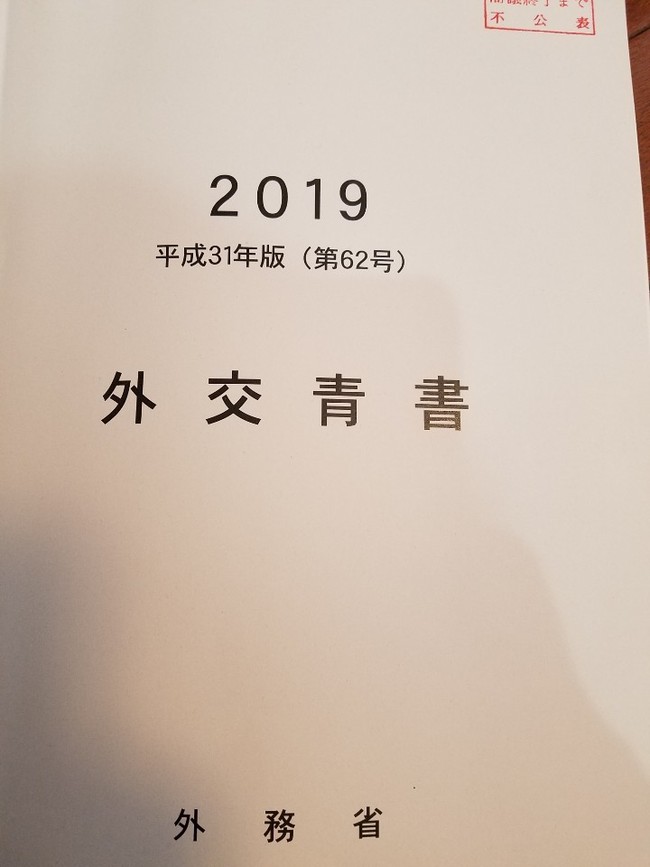 |
|
The cover of Japan’s 2019 Diplomatic Bluebook. (Cho Ki-weon, Tokyo correspondent)
|
2019 edition differs from last year’s by omitting language referring to improving relations
In its 2019 Diplomatic Bluebook, the Japanese government described relations with South Korea as “facing a very difficult situation amid a series of negative activities on the part of South Korea.” Released on Apr. 23 by the Japanese Foreign Ministry, the Diplomatic Bluebook listed South Korean Supreme Court rulings ordering compensation of forced labor by Japanese businesses, the announcement of the disbanding of the Reconciliation and Healing Foundation for comfort women survivors, issues surrounding the use of the Rising Sun Flag on Japanese military ships, and friction over low-altitude flybys by Japan Self-Defense Forces aircraft as examples of “negative activities” by South Korea. While last year’s Diplomatic Bluebook acknowledged the “presence of some difficult issues in Japan-South Korea relations” but asserted that it was “important to continue managing matters appropriately and developing them in a forward-looking direction,” this year’s version omits the reference to forward-looking development. Instead, it states that Japan “will demand an appropriate response from South Korea based on our consistent position, while collaborating closely with South Korea and with South Korea and the US on North Korea-related issues.” Japan passes off responsibility for souring bilateral relations onto South Korea The term “former civilian conscripted workers,” which Japan used last year to describe victims of forced labor conscription, was changed this year to “former workers from the Korean Peninsula.” The name, proposed by Prime Minister Shinzo Abe in an effort to downplay the significance of the forced labor conscription, has been used by the Japanese government since November of last year. The Bluebook also dedicates a separate section to the court rulings on labor conscripting, stressing that Japan “cannot accept the legal foundation of Japan and South Korea’s relationship of friendship and cooperation being overturned” and “will continue to respond appropriately while considering various options up to and including an international hearing and objection measures.” Referring to Dokdo, the document reiterated Tokyo’s position that the islets are “Japanese territory according to international law,” which South Korea is “illegally occupying.” On the matter of labeling the East Sea on maps, it insisted that “Sea of Japan” was the “only internationally established name.” The East Sea labeling issue first appeared in the Diplomatic Bluebook last year. The South Korean government responded in the form of a Ministry of Foreign Affairs spokesperson’s statement. “We vehemently object to the Japanese government repeating unreasonable claims in its Diplomatic Bluebook about the ownership of Dokdo, which is unambiguously South Korean territory historically, geographically, and by international law, and we urge their immediate retraction,” the statement said. The Ministry of Foreign Affairs also summoned DKoichi Mizujima, a diplomatic minister in the Japanese Embassy in Seoul, to protest the Bluebook’s claims regarding Dokdo, the comfort women, forced labor conscription, and labeling of the East Sea. By Cho Ki-weon, Tokyo correspondent Please direct comments or questions to [english@hani.co.kr]






